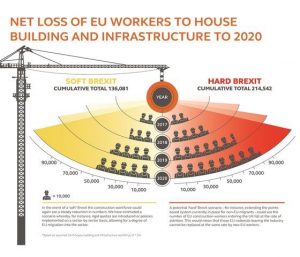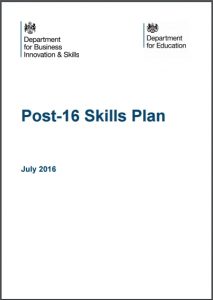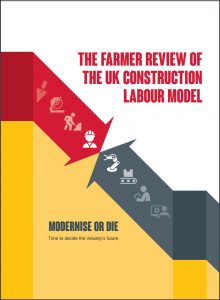The deadline for responses to the UK Government’s industrial strategy green paper (published on 23 January 2017) passed last week, and it’s been interesting to monitor some of the responses that are now being published (here is what the Open Data Institute had to say, for example).
Little mention of construction
But before we look quickly at two of the responses, what did the green paper set out to do for construction? Well, it mentioned construction just seven times (excluding notes and photo acknowledgements) in 138 pages. And the pressing challenge of construction skills shortages is only fleetingly addressed on page 53:
“There have also been problems with the delivery of schemes. Projects have been delayed by years and provided at excessive cost. There has been improvement in recent years, but the local planning and consent system still remains a contributing factor in some instances. There has also been fragmentation in the construction sector and its supply chain, with businesses often unable to deliver long term investment at large scale. This is combined with shortages in key construction skills.”
However, it does highlight some “acute and urgent skills shortages in key industrial sectors including infrastructure and the nuclear industry”, noting that in some sectors (road and rail, for example) action is already being taken through the creation of sector-specific national colleges. But it highlights:
“… previous efforts by the Government and industry to forecast skills shortages have lacked the accuracy to enable timely and effective action, and that further action could be taken to ensure that we can better identify and address future shortages.” (p.45)
Clearly, we feel these are areas where SkillsPlanner could help, particularly if central and local government, plus industry and training organisations, collaborated better.
Developing skills
The subject of ‘skills,’ on the other hand, is a central theme in the consultation paper. The document discusses ten pillars to its strategy, of which the second is Developing skills:
“Developing skills – we must help people and businesses to thrive by: ensuring everyone has the basic skills needed in a modern economy; building a new system of technical education to benefit the half of young people who do not go to university; boosting STEM (science, technology, engineering and maths) skills, digital skills and numeracy; and by raising skill levels in lagging areas.” (p.11)
On these ‘lagging areas’, it points out that we have a shortage of technical-level skills, that we rank 16th out of 20 OECD countries for the proportion of people with technical qualifications, and that we have particular skills shortages in sectors that depend on STEM subjects (p.16). Alarmingly, when, within the next two decades, 90 per cent of jobs will require some digital proficiency, 23 per cent of adults lack basic digital skills.
It also suggests that industry has to help shape qualifications and the curriculum – for technical qualifications in particular – to ensure they are useful to future employers (p.37). Much of the skills strategy reflects thinking already shared in the July 2016 Skills plan (post).
AoC and ICE responses
One of our partners on the SkillsPlanner project is the Association of Colleges (AoC), and its response (delivered jointly with the Open University) to the consultation paper strongly welcomes the focus on developing skills. It calls for:
“a coherent national skills strategy, designed with flexibility to meet individual’s needs and circumstances and those of employers; one that pulls together and builds on the best of what is already out there through collaboration and partnership.”
Given the importance placed on infrastructure in the consultation paper, the Institution of Civil Engineers’ response is particularly pertinent, and in the first of its three key recommendations, puts “demand scenarios” and “foresight on skills needs” right at the heart of future planning:
Regional infrastructure pipelines should be developed to address skills gaps
Realising growth through infrastructure requires improved skills provision. To give a fuller picture of demand scenarios, regional infrastructure pipelines identifying upcoming projects and providing foresight on skills needs, should be put in place.


 A year ago (read
A year ago (read 
 “change the way the Government supports training in the construction industry” – This will include the conclusion of an ongoing review, chaired by Paul Morrell, of the Construction Industry Training Board’s purpose, functions and operations, with the government looking to “ensure that developers benefitting from public funding use the projects to train the workforce of the future.”
“change the way the Government supports training in the construction industry” – This will include the conclusion of an ongoing review, chaired by Paul Morrell, of the Construction Industry Training Board’s purpose, functions and operations, with the government looking to “ensure that developers benefitting from public funding use the projects to train the workforce of the future.” “The increasing importance of data means that such approaches would better enable the business case for investment in training and new ways of delivering by better aligning investment to a demand pipeline. … The culture of ‘data silos’ within the industry needs to be broken as part of the wider societal democratisation of data.”
“The increasing importance of data means that such approaches would better enable the business case for investment in training and new ways of delivering by better aligning investment to a demand pipeline. … The culture of ‘data silos’ within the industry needs to be broken as part of the wider societal democratisation of data.” The SkillsPlanner project was formally launched on 24 February 2016 at the Institution of Civil Engineers in London. Over 130 guests listened as programme director Rebecca Lovelace introduced the project, followed by keynote speakers Andy Mitchell CBE, CEO of Tideway (right), and Sir Nigel Shadbolt, founding partner of Seme4 – both organisations are
The SkillsPlanner project was formally launched on 24 February 2016 at the Institution of Civil Engineers in London. Over 130 guests listened as programme director Rebecca Lovelace introduced the project, followed by keynote speakers Andy Mitchell CBE, CEO of Tideway (right), and Sir Nigel Shadbolt, founding partner of Seme4 – both organisations are 

 During the evening, #SkillsPlanner featured heavily on Twitter, with over 200 tweets from more than 50 contributors. Read our
During the evening, #SkillsPlanner featured heavily on Twitter, with over 200 tweets from more than 50 contributors. Read our 
